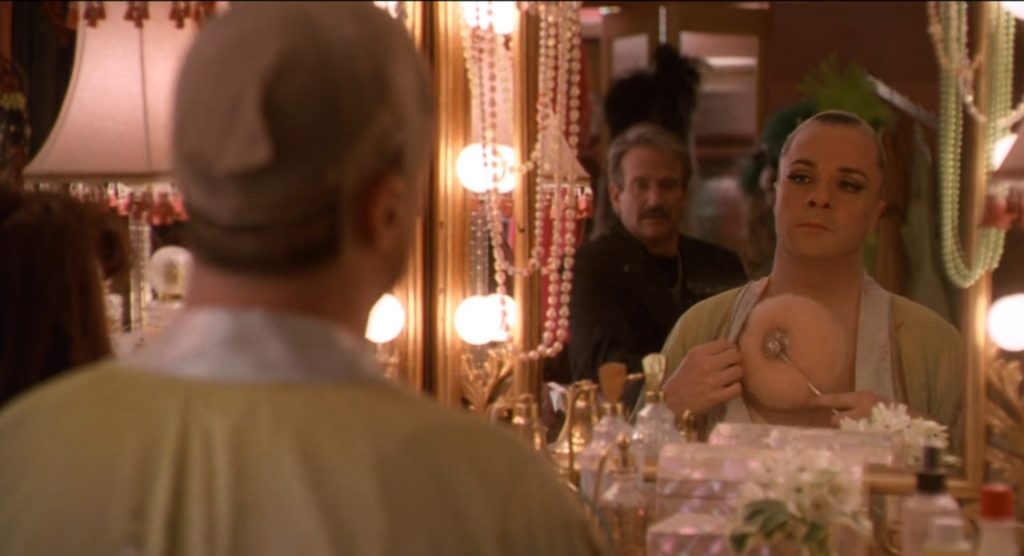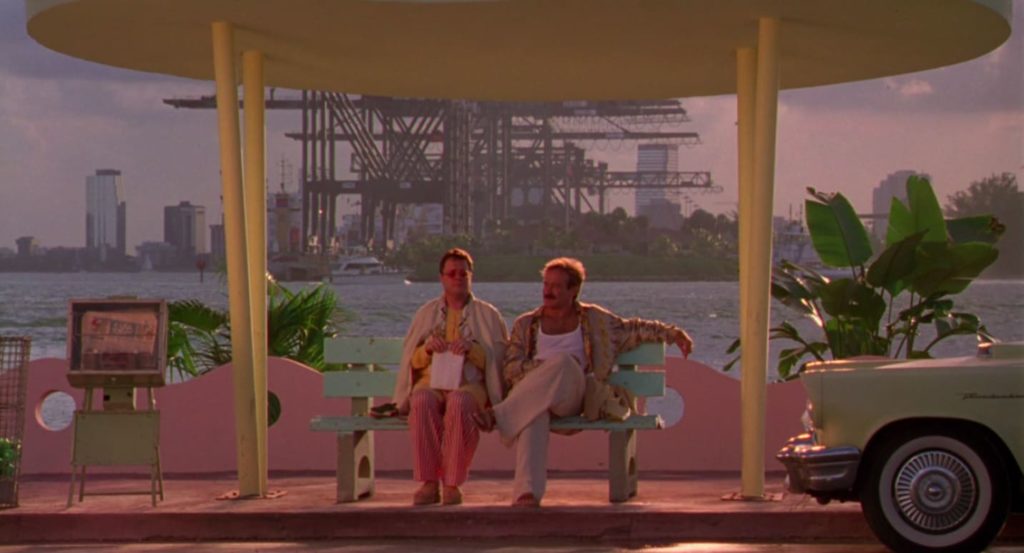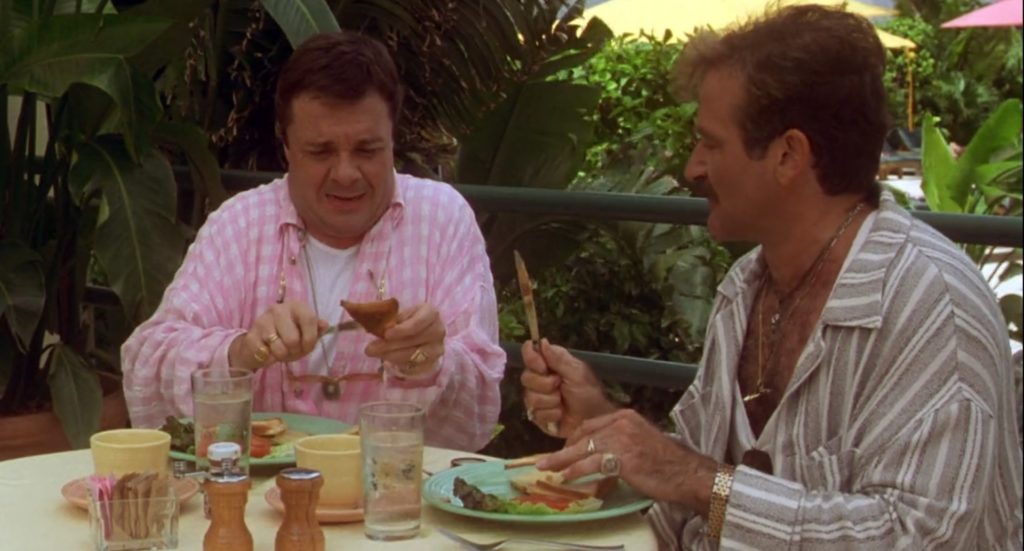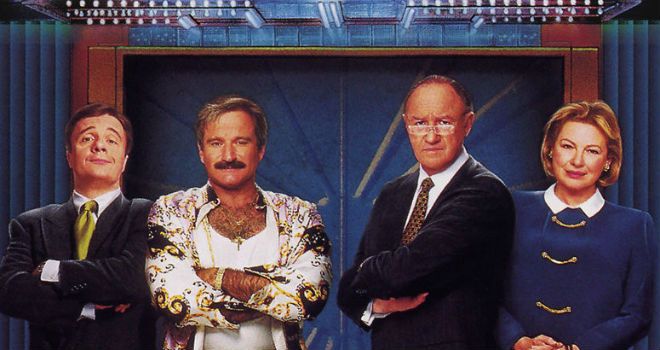Spoiler warning for minor plot details
If there’s one thing The Birdcage (1996) remains after 25 years, it is irresistible. This it makes clear from its lively and impressive opening sequence, in which the camera descends upon the shores of Miami Beach and makes its way to the titular drag club, where we are introduced to the most exuberant of drag performances set to the Sister Sledge classic, “We Are Family.” From there, we come to meet the club’s owner, Armand Goldman (played by Robin Williams), and his partner, Albert (Nathan Lane), who performs nightly as the club’s headliner, “Starina.” Right away, it is clear that this is a place that safeguards the LGBTQ+ community and doesn’t fail to make us laugh.

And that The Birdcage does in full, especially after Armand’s son, Val (Dan Futterman), announces that he is getting married to the daughter of right-wing, ultra-conservative Senator Kevin Keeley (Gene Hackman) and his wife, Louise (Dianne Wiest). To make matters worse, the Keeleys are on their way to Florida to meet them. The most logical solution: play it straight, of course! A remake of the French farce La Cage aux Folles (1978), this Mike Nichols-directed interpretation was, in many ways, bolstered by the sociopolitical context in which it entered the public consciousness. Though the original film was equally ahead of its time in the way it captured how men could enjoy subverting masculine expectations and still be in a happy relationship, it did not have much of a barrier to overcome.
The remake, on the other hand, was released at a time when LGBTQ+ culture was becoming more prominent in America, and for all the wrong reasons. The paranoia and turmoil of the AIDS crisis paralleled an increasingly cautious public perception of the gay community, a perception that was only exacerbated by the “Don’t Ask, Don’t Tell” policies of the Clinton administration. With these factors in mind, perhaps the most amazing and, dare I say, groundbreaking quality about The Birdcage is how removed it is from both illness and insensitivity. Whereas films preceding it were often somber stories about the tribulations of being gay in a conservatively straight world, Nichols and screenwriter Elaine May expose the fallacies of conservatism as traditional values are thrown into a more open-minded space. They don’t care how far the community has fallen so much as how high they can rebuild themselves.

The light-hearted narrative makes Keeley’s concern about the lack of tradition and “moral order” in America a primary source of humor while giving all the agency to its gay characters. May’s brilliantly warm screenplay takes aim at the very concept of masculinity, and the homophobia that allows for narrow-minded assumptions about such a concept. With the indelible chemistry between Williams and Lane doing her nothing but favors, the film achieves some of its most well-earned moments of humor when poking fun at the deep-seated American notions of what it means to be a “real man” and the firm exterior certain individuals struggle to maintain for fear of their identities being discovered by others.
When Val initially suggests sending Albert away during the Keeleys’ visit and tells his father to tone down his mannerisms, Armand responds firmly to his son’s disrespect: “Yes, I wear foundation. Yes, I live with a man. Yes, I’m a middle-aged fag. But I know who I am, Val. It took me twenty years to get here, and I’m not gonna let some idiot senator destroy that.” This empowering declaration of his true self is matched only by the hilarious, not to mention fruitless, attempt on Albert’s part to tone down his own effeminate qualities, which threaten to undermine his goal of passing as Val’s uncle. Albert is more than willing to give it a try, however, as he attempts to “smear” mustard on a piece of toast and walk like John Wayne in order to conform to the entrenched mannerisms of manhood.
The obvious humor of the sequence is in how over-the-top Albert still manages to be, and Lane sells his character extremely well, though this humor is not without its share of commentary. Armand’s response to his partner’s attempt at John Wayne’s gait is “It’s perfect. I just never realized John Wayne walked like that,” and even when Albert wonders whether or not his take on water cooler talk is manly enough, Armand admits he isn’t sure. His reaction, though nothing short of the comedic gold one could have expected from the late Williams, is nevertheless an indictment of how pointless of a charade a heterosexual appearance can be for those unwilling to conform to it, and how the values supported by this charade allows gender binaries to exist. Rather than using Armand and Albert’s queerness to deliver laughs, as has been- insensitively so- a tried and true method of comedy in the past, The Birdcage instead celebrates it as something that endears them to one another. It finds humor in Albert’s ridiculous attempt to break away from who he really is, playing off heterosexuality as the kind of drag routine he is used to.

This, of course, being a comedy, Murphy’s law very much applies, as anything that could possibly go wrong during the climactic dinner between the two families does just that. But the film’s full-circle conclusion will have you cheering as Armand and Albert’s heroism in the face of adversity leads to a favorable outcome for everyone involved in their scheme. Moreover, the fact that the film concludes with its queer characters no worse off represents what the film tries to achieve in its positive enabling of gender performativity. This enabling is especially prescient by today’s standards, as marriage equality has now become a legal right in the United States. It is all the more prescient given the contemporary legislation that still attempts to bar the LGBTQ+ community from certain pleasures in American culture.
What’s even more is what The Birdcage continues to represent for depictions of gay individuals on film. Though directed by a straight man, the film was a drastic but empowering departure from the films of the New Queer Cinema movement, which allowed queer directors and storytellers to finally raise their voices through the cinematic image. The difference was that this was an independent film movement, and the issue of queerness was often a hindrance to the characters portrayed within these films. Even the trace number of films that Hollywood used to tackle the issue themselves prior to Nichols’ film, notably Philadelphia (1993), followed suit. The Birdcage was an idea that a mainstream American film studio had hardly ever considered, but one that has paid off in spades. As the enduring masterpiece it is, it knows that. It wasn’t afraid to break boundaries, and for that, it does not apologize.
Incluvie Score: 5/5
Movie Score: 4.5/5

Comments